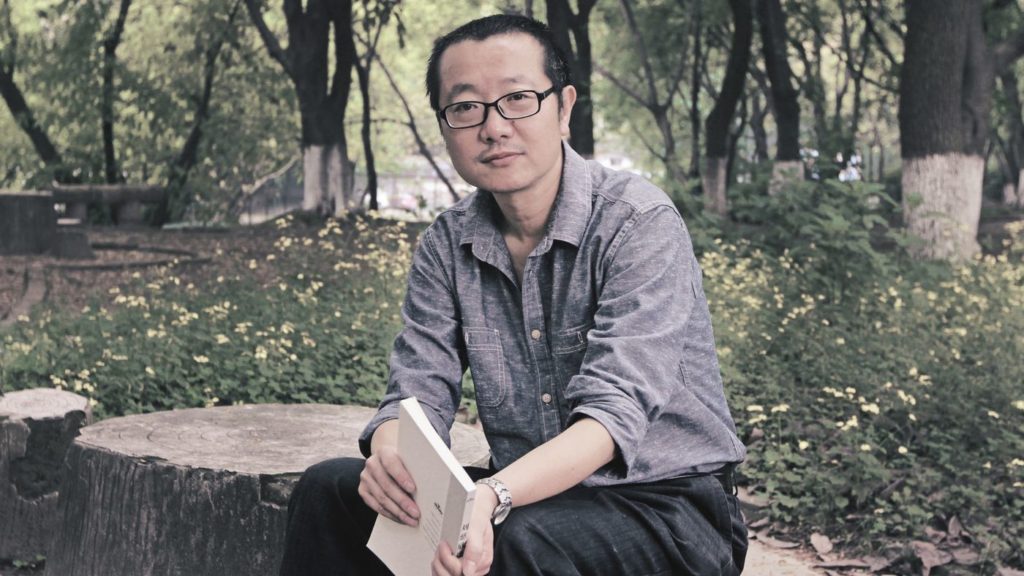“I’m so tired of the future.” It was late in the day at the Tsinghua University Art Museum and I was getting whiny. My boyfriend and an acquaintance thumbed through some catalogs near the exit and managed to ignore me. We had reached the end of an exhibit of architectural models from the firm Foster + Partners: London’s Gherkin, a cruise ship terminal, sundry airports… I’m a Berliner and the most dizzying display was a table of alternate models for the Reichstag dome, a dozen potential realities in balsa and cardboard. In the final room, an animated video envisioned some sort of building project in space—on Mars maybe?—but I couldn’t really muster the energy to watch it.
It’s been said that the past is a foreign country, and I’ve come to believe that the future is too, I’d just never been so immersed in it before. In Beijing this summer, I read about two thousand pages of work by Cixin Liu, possibly the world’s most important living science-fiction author, and certainly among humanity’s most imaginative prognosticators. (A recent LRB review called his Three Body trilogy, published in English in 2016, “one of the most ambitious works of science fiction ever written.”) Like life in Beijing, the experience was magnificent and exhausting and thrilling and flawed. Science fiction might be the genre best suited to Chinese society today; the breakneck pace of change becomes a constant, and to live in the present is to anticipate what is to come. When we told our acquaintance that we’d like to return next summer, she responded as many of our Chinese friends did: “You might not recognize it here.”
Living at this pace requires flexibility and ingenuity; you are making up the story of the future as you go along. Everything, the first time we do it, is a fiction. The surety of truth comes only with repetition and belongs to things we know from the past. But the past also becomes rapidly unfamiliar once we are not repeating its methods: another friend, when we told him that we didn’t have Chinese bank accounts and therefore couldn’t use our phones to pay for purchases or order takeout, looked at us with fascinated pity, murmuring “It’s like you’re living some sort of social experiment!”
Reading Cixin Liu on the spotless, teeming subway (the world’s busiest annually) could be described as therapeutic. I often felt I was caught in the eddies of a time warp in China, a society that’s all but done away with paper currency but does not yet have potable tap water; one in which facial recognition software will prevent you from stealing toilet paper but the plumbing can’t handle flushing it. Remember William Gibson’s old saw “The future is already here—it’s just not very evenly distributed”? In Beijing that’s true on a meter-for-meter basis. Liu writes hard science fiction, and his plots are propelled by the human pursuit of relentless scientific advancement. To read them is to be gripped by the frisson of discovery, of the infinite and infinitesimal brought within our comprehension. They give the comforting sense that humanity is rushing toward something, rather than just thronging along the ring line staring at their phones.
This August, Tor released a new English translation of Liu’s Ball Lightning, an earlier novel much more limited in scope than the Three Body trilogy, that nonetheless demonstrates the power of Liu’s scientific imagination. Ball lightning is what it sounds like—an unexplained atmospheric phenomenon, usually associated with thunderstorms, in which a slow-moving ball of electricity floats near the earth’s surface, then explodes. The protagonist Chen sees his parents incinerated by a freak occurrence of the phenomenon, and spends his life trying to understand it. The book follows him through university and graduate school, onto civilian and military research projects, a quest that takes him to the limits of our understanding of physics. It’s also the sort of bureaucratic Bildungsroman only communism could produce, full of meetings, endless hierarchies, and funding issues; ball lightning may fuel Chen’s dreams, but officialdom determines their trajectory. Chen’s dilemma is that, in order to pursue his research, he must allow his discoveries to be used to destructive ends. As always with Liu, human curiosity wins out, with large-scale geopolitical ramifications.
Ball Lightning was originally published in 2004, which means that the society it emerged from is now antediluvian in Chinese terms, but the book’s focus on grand scientific and ethical questions place it somewhat outside of the flow of time. The human cost of technical progress and development is always in the air in China—in the form of PM2.5 particles—and I would imagine that AI developers feel much the same as Chen when their work is in the service of surveillance.
Liu may be so prodigiously creative that his alternate futures are timeless, but they are by no means perfect. At a sentence level, Liu’s work is uniformly bad—lines on the order of “No one could have anticipated that my ominous prediction would be fulfilled that very night” abound. His plotlines tend toward the maudlin (Ball Lightning has a cringeworthy weaponized killer-bees subplot, for example), his characters are wooden. Were we to put Liu’s misogyny in terms of an air quality index, giving the first book in the Three Body trilogy a rating of unhealthy and the last two a rating of hazardous, Ball Lightning would be very unhealthy, somewhere in the middle.
But to be honest, it doesn’t matter, we are here for one thing and one thing only: Liu’s ideas. (Actually, the misogyny matters. I can’t enjoy Liu’s work fully because of it, but that’s another essay.) His books are propelled by the fascination of scientific discovery, in which the mysteries of existence unfold around the reader. In Liu’s hands, everyday reality reveals itself to be composed of marvels, and the results are nothing less than mind-blowing. For example, as one character explains in Ball Lightning: “In the briefest period after the Big Bang, all of space was flat. Later, as energy levels subsided, wrinkles appeared in space, which gave birth to all of the fundamental particles. What’s been so mystifying for us is why the wrinkles should only appear at the microscopic level. Are there really no macroscopic wrinkles? Or, in other words, are there no macroscopic fundamental particles?” From this single, intriguing question, Liu extrapolates a series of ramifications that ripple through human existence, from defense and politics to the nature of the soul and the afterlife. Liu’s visions of the future are so vivid and near-at-hand because he presents them as extensions of reality around us. Another dimension is available to us within the world we know, accessible through human ingenuity; just because something is invisible to us now doesn’t mean that it won’t soon materialize. To join Liu in this perspective is to recognize the most fantastic aspects of our reality.
This immanence and imminence of possibility felt true to the fabric of my experience of China, the not-quite-benign magic of the unexpected. The only predictable aspect was my reaction when enchantment eventually gave way to exhaustion. On our final day in Beijing, I dumped Cixin Liu’s books in a trash bin on our hutong—they were too bulky to carry back and we didn’t know anyone who would want to read them in English. I feel a bit cowardly admitting it: the future is nice to visit, but I’m not sure I would want to live there.
Amanda DeMarco is a translator living in Berlin
from The Paris Review https://ift.tt/2x0U8wW


Comments
Post a Comment